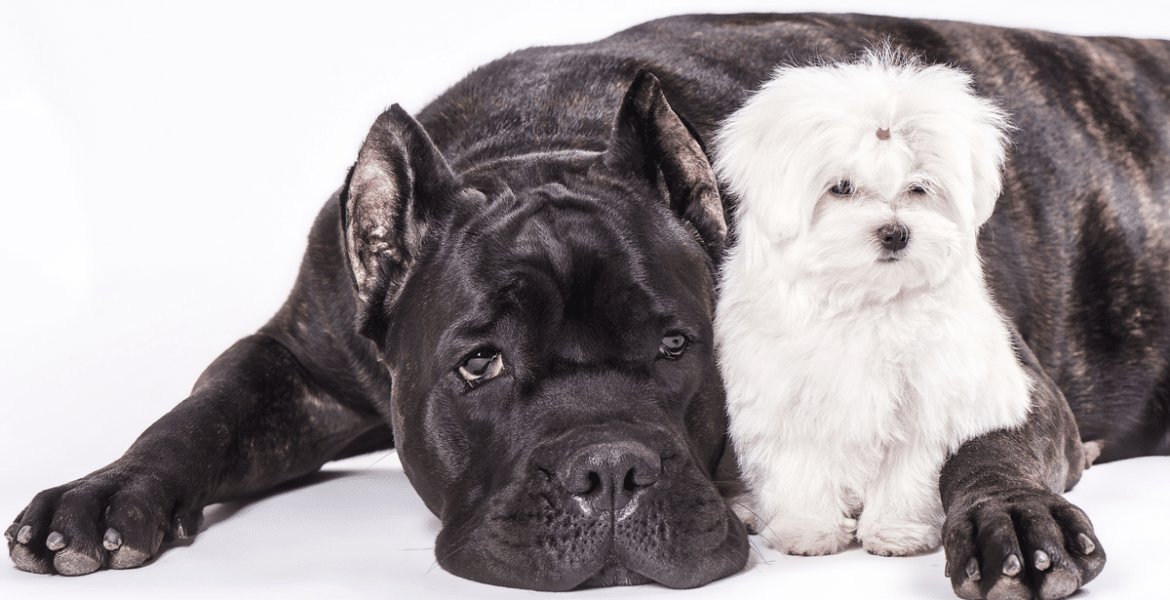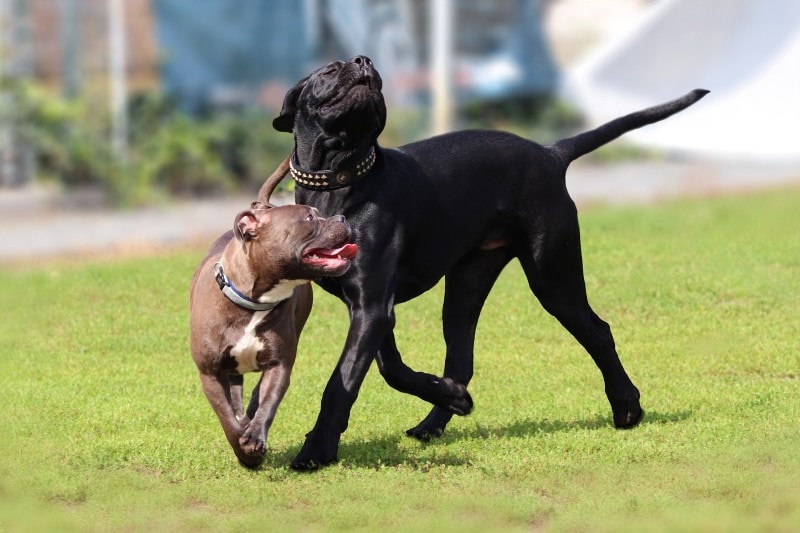Are Cane Corsos good with other dogs? Despite their imposing size and strong protective instincts, Cane Corsos can actually be very good with other dogs. These powerful breeds have a history of being used as working dogs alongside other canines, showcasing their ability to get along and work together harmoniously.
Cane Corsos, when properly socialized and trained, can have positive interactions with other dogs. It is important to note that early socialization and consistent training are key factors in raising a well-behaved and sociable Cane Corso. With the right introduction and ongoing socialization, they can form strong bonds with other dogs and live peacefully in multi-dog households. So, while their size and protective nature may require a conscientious approach, Cane Corsos can indeed be good with other dogs.
Cane Corsos can be good with other dogs with proper socialization and training. It’s important to introduce them gradually and supervise their interactions. Provide positive experiences and rewards for good behavior to promote a harmonious relationship. Always monitor their body language and intervene if any signs of aggression or discomfort arise. With the right approach, Cane Corsos can coexist peacefully with other dogs.

Are Cane Corso Good with Other Dogs?
In this article, we will explore the topic of whether Cane Corsos are good with other dogs. Cane Corsos are powerful and intelligent dogs that have a reputation for being protective and loyal. However, their interactions with other dogs may vary depending on factors such as socialization, training, and individual temperament. We will delve into the characteristics of Cane Corsos, provide insights into their behavior with other dogs, and offer tips for ensuring positive interactions. Let’s dive in!
Understanding the Cane Corso Breed
The Cane Corso is an ancient Italian breed known for its strong physique and protective nature. They were originally bred for tasks like guarding livestock and property. Cane Corsos are large dogs, with males weighing between 99-110 pounds and females weighing between 88-99 pounds. They have a muscular build, a short coat, and a distinctive square-shaped head. Despite their imposing appearance, Cane Corsos can be gentle, affectionate, and obedient when properly trained and socialized.
It’s important to note that every individual dog is unique and may have different temperaments and personalities. While some Cane Corsos may get along well with other dogs, others may exhibit more dominant or territorial behaviors. It is crucial to assess each Cane Corso’s behavior on a case-by-case basis and provide appropriate training and socialization to ensure positive interactions with other dogs.
Factors Affecting Cane Corso’s Behavior with Other Dogs
Several factors contribute to how a Cane Corso will behave around other dogs. Let’s explore these factors:
Socialization:
Proper socialization plays a vital role in shaping a Cane Corso’s behavior towards other dogs. Early exposure to different environments, people, and other animals helps them develop better social skills. Positive experiences during the critical socialization period, which is between 4 and 16 weeks of age, can significantly influence how a Cane Corso interacts with other dogs throughout their lives.
Training:
Training a Cane Corso is essential to establish boundaries, obedience, and proper behavior. Positive reinforcement techniques, such as rewards and praise, work well with this breed. Consistent training helps Cane Corsos understand appropriate behaviors when interacting with other dogs. It also helps them develop good impulse control, which can prevent aggressive or dominant responses.
Individual Temperament:
While Cane Corsos generally have protective instincts, individual temperaments can vary. Some Cane Corsos may be more friendly and sociable, enjoying the company of other dogs, while others may be reserved or less tolerant. It is crucial to assess each dog’s personality and make informed decisions regarding their interactions with other dogs.
Tips for Positive Interactions with Other Dogs
Now that we understand the factors affecting a Cane Corso’s behavior with other dogs, let’s explore some tips for ensuring positive interactions:
Early Socialization:
Start socializing your Cane Corso at a young age. Expose them to various environments, people, and dogs in controlled settings. Gradually increase the complexity of interactions to help them develop confidence and positive associations.
Proper Training:
Consistent training helps Cane Corsos understand how to behave around other dogs. Teach them basic commands like “sit,” “stay,” and “leave it,” which can be useful during interactions. Reward good behavior and gently correct any inappropriate behavior to reinforce positive habits.
Supervised Introductions:
When introducing your Cane Corso to other dogs, start in a neutral territory and keep both dogs on a leash. Observe their body language and behavior closely. Allow them to sniff and interact while maintaining control. If any signs of aggression or tension arise, separate the dogs and try again later or seek professional help.
Common Myths Debunked
Let’s debunk some common myths about Cane Corsos’ behavior with other dogs:
Myth 1: Cane Corsos are always aggressive towards other dogs.
While Cane Corsos have protective instincts, not all of them are aggressive towards other dogs. Proper socialization and training can help them develop positive relationships.
Myth 2: Cane Corsos cannot live with other dogs.
Cane Corsos can live harmoniously with other dogs when introduced and socialized properly. It’s important to choose compatible dogs and monitor their interactions initially.
Myth 3: Cane Corsos should only be kept as the only dog in a household.
While some Cane Corsos may prefer to be the only dog, others can thrive in multi-dog households with proper introductions, socialization, and training.
Key Statistics:
According to a survey conducted by the American Temperament Test Society, the Cane Corso breed had a passing rate of 85.3% in temperament tests, demonstrating stability, sociability, and confidence. This indicates that a majority of Cane Corsos have the potential to interact positively with other dogs when provided with the right training and socialization.
In conclusion, Cane Corsos can be good with other dogs when given proper training, socialization, and individual assessment. With early socialization, consistent training, and supervision during interactions, Cane Corsos can develop positive relationships with other dogs. Remember that every dog is unique, and it’s essential to evaluate each Cane Corso individually and seek professional help if needed. By understanding their breed traits, providing the right environment, and investing in their training and socialization, you can increase the chances of your Cane Corso having positive interactions with other dogs.
Key Takeaways: Are Cane Corso Good with Other Dogs?
In our professional opinion, here are the key takeaways regarding whether Cane Corsos are good with other dogs:
- Cane Corsos can be good with other dogs if properly socialized and trained.
- Early socialization is crucial for Cane Corsos to develop positive behaviors towards other dogs.
- Individual temperament plays a role in determining compatibility with other dogs.
- Supervised introductions and gradual interactions can help Cane Corsos adapt to new dogs.
- Not all Cane Corsos will get along well with other dogs, so careful assessment is important.
Frequently Asked Questions
Are you curious about how Cane Corsos interact with other dogs? Here are some common queries answered:
1. Are Cane Corsos naturally good with other dogs?
While every Cane Corso is unique, they tend to have a dominant personality and can be wary of unfamiliar dogs. Early socialization and training are essential for them to develop good habits and positive interactions with other canines. Proper introductions and controlled exposure can help them become more accepting of other dogs. It’s vital to supervise their interactions and monitor their behavior to ensure everyone’s safety.
Remember, it’s crucial to understand that individual temperament can vary, and not all Cane Corsos will react the same way around other dogs. Proper socialization and training play a significant role in how well Cane Corsos get along with their furry counterparts.
2. Can Cane Corsos live peacefully with other dogs in the same household?
Given their dominant nature, Cane Corsos may not always thrive in households with other dogs, especially if they are of the same sex. However, successful cohabitation is possible with proper introductions, early socialization, and training. Gradual introductions in neutral territories, like a park, allow the dogs to become acquainted without feeling territorial. Slowly integrating them into shared spaces under supervision helps establish boundaries and avoid conflicts.
When living with other dogs, it’s essential to provide each dog with its own space, toys, and attention to prevent resource guarding. Consistency in training, rewarding good behavior, and addressing conflicts promptly will create an environment where Cane Corsos can live peacefully alongside their fellow canines.
3. Is it safe to have a Cane Corso with small dogs?
Introducing a Cane Corso to a household with small dogs requires careful attention and supervision. Due to their strong prey drive, Cane Corsos may see smaller animals as potential prey. However, with proper socialization and training, they can peacefully coexist. Early introductions while both dogs are young and supervised play sessions can help promote friendship and reduce potential problems.
It’s crucial to set clear boundaries and teach the Cane Corso to be gentle and respectful around smaller dogs. Providing separate spaces for each dog and allowing them to have supervised but separate playtimes can also help foster a safe and harmonious environment.
4. How can I help my Cane Corso get along better with other dogs?
To enhance your Cane Corso’s social skills, expose them to various experiences from a young age. Enroll them in puppy socialization classes where they can interact with other dogs under professional supervision. Positive reinforcement training methods also play a crucial role in shaping their behavior and teaching them appropriate social skills.
Gradually increase their exposure to different dogs in controlled environments, rewarding them for calm and friendly behavior. Consistently practicing obedience commands, such as “sit” and “stay,” helps them stay focused during interactions. Remember that every interaction should be a positive experience for your Cane Corso, promoting confidence and good behavior around other dogs.
5. Are there any situations where Cane Corsos may not be compatible with other dogs?
While Cane Corsos can coexist with other dogs, some situations may not be ideal for them. If your Cane Corso has a history of aggression towards other dogs, it’s important to consult with a professional dog trainer or behaviorist. They can assess the situation and provide guidance on managing your dog’s behavior and potential compatibility with other dogs.
Additionally, if you have smaller pets like rabbits, guinea pigs, or cats, it’s important to introduce them to a Cane Corso gradually and carefully. Their strong prey drive may pose a risk to such animals, and close supervision is always necessary to ensure their safety.

In summary, while Cane Corsos have the potential to get along with other dogs, it is important to approach introductions with care and provide proper socialization and training. Each dog is unique, so compatibility may vary. Seeking professional guidance can ensure a harmonious and safe environment for all dogs involved.
